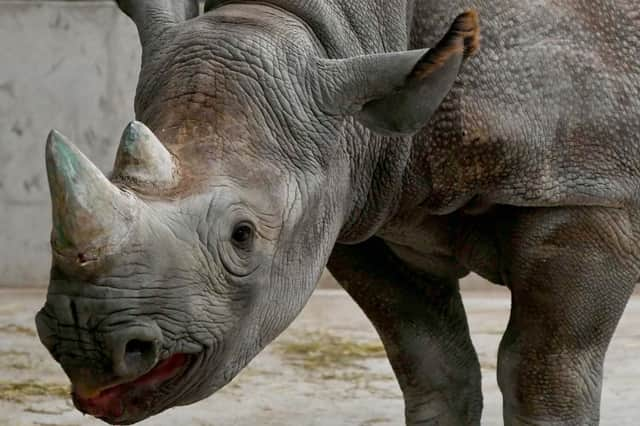Endangered black rhino, Najuma, arrives at Yorkshire Wildlife Park


The two-year-old will play a pivotal role in an ambitious international breeding programme to help the species recover from the brink of extinction.
The female black rhino, who was transferred from a German zoo, arrived at the park on December 4 after a 600 mile-long journey by road and ferry.
Advertisement
Hide AdAdvertisement
Hide AdWhen she is old enough Najuma will be paired with three-year-old Makibo at the Into Africa reserve in the hope she can give birth to calves that will eventually be reintroduced into the wild.
The European Association of Zoos and Aquariums (EAZA) is co-ordinating a breeding programme that will generate the largest ever move of rhinos from Europe to Rwanda and will be accompanied by a comprehensive education, research and protection campaign.
'It was amazing to welcome Najuma and start settling her into the house. Hopefully in the future she will breed with Makibo, their offspring could be crucial to the future of the black rhino,' said Simon Marsh, animal collections manager of the park at Branton, near Doncaster.
'With the zoo community working together, the idea is to breed black rhinos and to strategically introduce them into the wild to help save the species. We hope to play a part in this comprehensive programme in the future which demonstrates our commitment and the collaboration between European zoos and the Rwanda government to save the species.'
Advertisement
Hide AdAdvertisement
Hide AdBlack rhino numbers have been devastated by poaching and habitat loss and plunged to 2,300 before recent efforts helped the total to recover slightly to 5,000.
The first captive-born black rhinos will be re-introduced into the Akagera National Park, a 1,222 sq km haven for wildlife near the borders with Tanzania, during 2019.
'There could be no better demonstration of the commitment of conservationists across two continents to the survival of rhinos than an action like this. We cannot stand idly by and allow this magnificent creature to be wiped off the face of the earth,' said EAZA Chair Thomas Kauffels.
YWP welcomed black rhinos Jasper and Makibo in March 2018 when the park's previous black rhino Hodari and Dayo moved to the Netherlands as part of the programme.
Advertisement
Hide AdAdvertisement
Hide AdThe Yorkshire Wildlife Park Foundation funds anti-poaching patrols to protect rhinos in the wild and also supports facilities, which care for orphaned rhino calves after their mothers have been tragically killed by poachers for their horn.
The Foundation was founded in 2013 as a dynamic catalyst for inspiring people to support conservation and welfare.
The Foundation also works with leading conservation organisations around the world to create better prospects for other endangered animals such as Amur tigers, Amur leopards, polar bears, and giraffes.